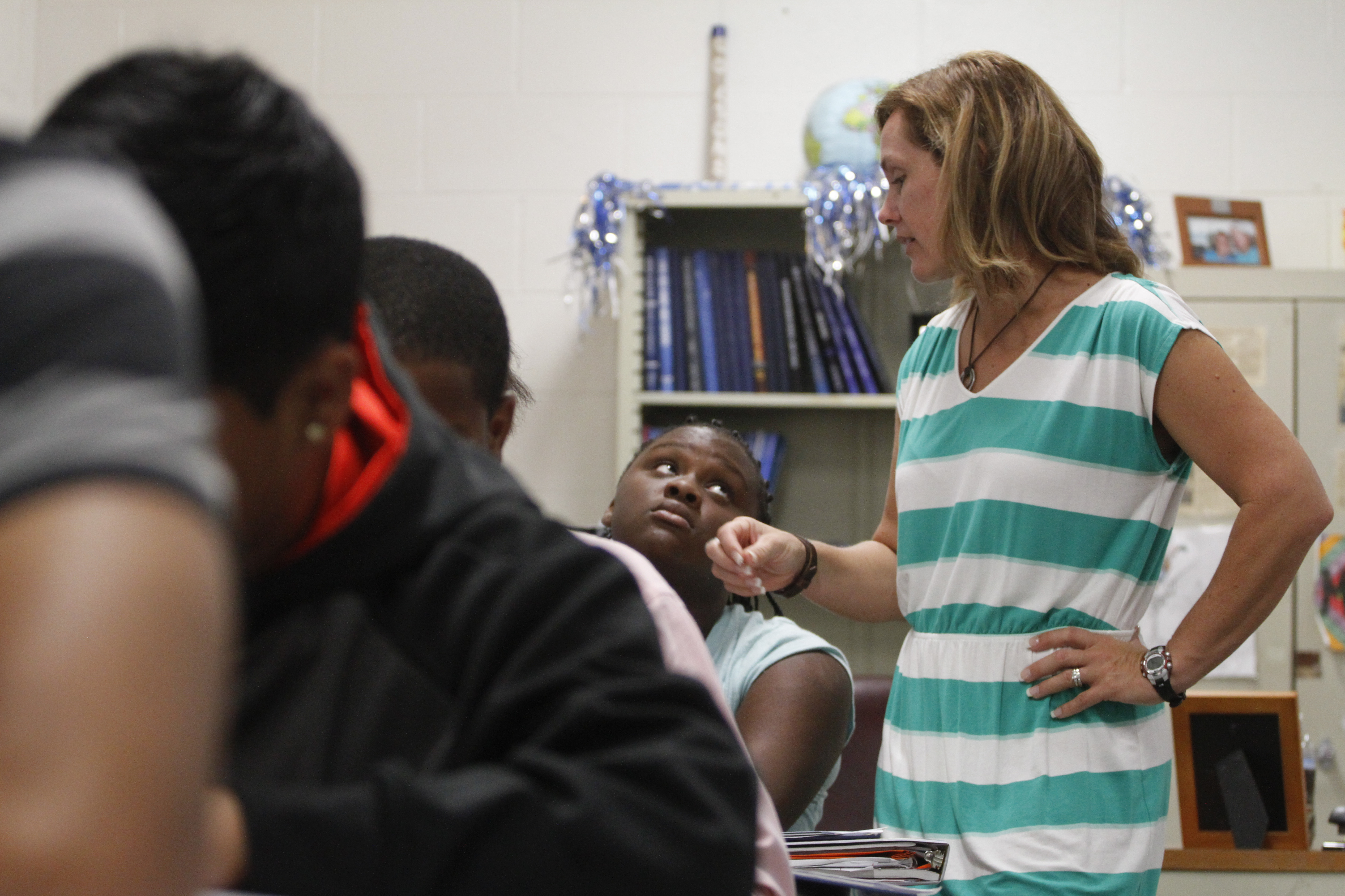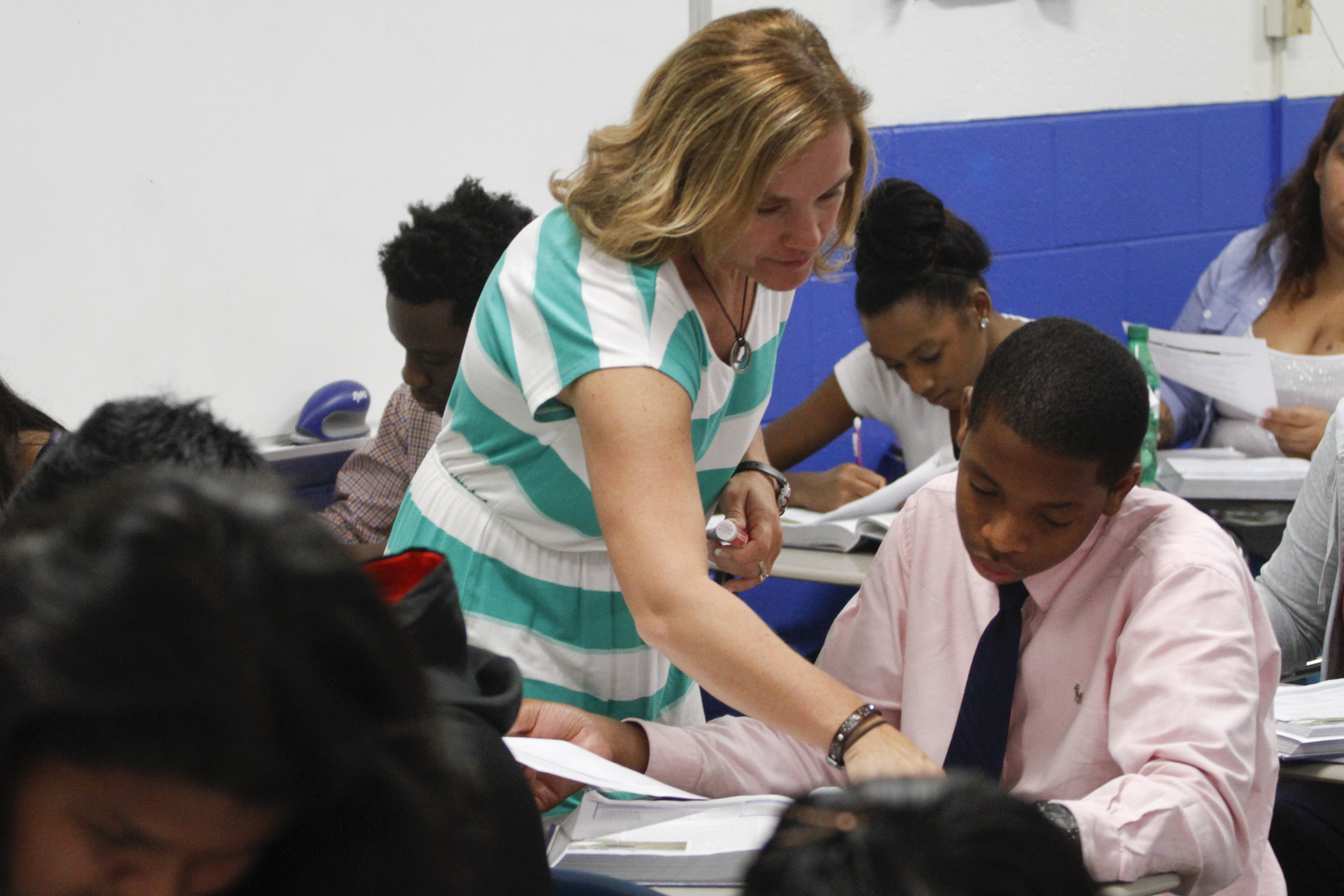For some people, going back to grade school is a gloomy proposition, the stuff of cold sweat and bad dreams. When Sarah Jackson was told in 2012 that she was going back to Girls Preparatory School, she wept.
Like many instructors who take up positions at their alma mater, however, the opportunity to teach in such a familiar setting was less of a nightmare and more of a dream come true.
"I got the [acceptance] email from Linda Mines, the chair of the history department," says Jackson, who graduated from GPS in 2006 and who now teaches history and social sciences at the school. "I was expecting a very genial, 'It was great to see you, but we went in another direction and wish you the best.'
"When the first line was, 'I'm thrilled ... to offer you this position,' I immediately started crying because I was so happy."
Jackson is one of many teachers in and around Chattanooga who say they longed for the opportunity to give back to the institutions that played such an important role in their formative years. At GPS, Jackson is one of 16 alumni instructors, who represent about 20 percent of the school's female faculty.
Students of alumna know their instructors once sat at the same desks and tackled the same workloads, which tends to create a bond of empathy, says Jessica Good, who has been employed by GPS since 1976 and currently serves as its upper school principal and assistant head of school.
"[The teacher] automatically has an 'in,'" Good writes in an email. "She has the basis of a good relationship with her students, and reaching the girls is all about establishing relationships. They also serve as examples that graduating from GPS is attainable and worth the effort."
The Hamilton County Department of Education's certified application doesn't require candidates to list the high school from which they graduated. But if an alumni is hired by their alma mater, they often bring with them an inherent enthusiasm for the school that other educators might lack, says Stacy Stewart, the school system's assistant superintendent for human resources.
"I think where students would benefit and where an alumni candidate may have an advantage over a non-alum is through the concept of 'buy in,'" Stewart writes in an email. "If the teacher or candidate didn't just attend the school, but also had a good experience there, carries with them a sense of school pride and has a vested interest in seeing the school remain successful ... that is a pretty good recipe for an employee who will give their all for the betterment of the school and its students."
COMING HOME
Mandi Munn graduated from Red Bank High School in 1995, and she says she was dead set on coming back when she decided to pursue a career as an educator while enrolled at the University of Tennessee at Chattanooga.
After two years teaching at Notre Dame High School, a position opened up at Red Bank in 2001 with the departure of former faculty members -- and fellow Red Bank Lions alumni -- Steve Hollander and John Pierce. Munn leaped at the chance to return to her alma mater, where she now teaches history and coaches the girls volleyball and softball teams.
Her whole family is now within the Red Bank system. Her sons, Christian Munn, 13, and Caden Cline, 12, are enrolled at Red Bank Middle School, where her husband, Randy Munn, is the guidance counselor and a coach for the wrestling and football teams.
Munn says her time at Red Bank as a student eased the transition to teaching, and she says she hopes her lifelong pride in the school encourages similar enthusiasm in her pupils.
"My whole family went to Red Bank, so I've been on this campus since I was little," she says. "There was something different about coming back. I just felt like I connected with the students and the faculty much better here.
"If students see teachers who have gone to school here and graduated and come back to give back to their school, and those teachers have a lot of pride and a stake in the school, then hopefully that will rub off on them as well."
A NEW ROLE
No matter how long the period between graduation and rejoining their alma mater as faculty, most alumni say accepting their new position can require some mental acrobatics.
In Jackson's case, the delay between being a GPS student and a GPS teacher wasn't a long one. She was hired by GPS just two years after graduating from the University of Alabama. Her only prior teaching experience had been a two-year stint as a member of Teach for America, an educational community outreach program similar to AmeriCorps.
That she was able to return to GPS so quickly was unexpected, she admits, and it wasn't easy learning to accept her new role working alongside people who had so recently been her instructors.
"I had to recognize that I was no longer a student," Jackson says. "[The other instructors] very readily accepted me as a peer and a colleague, but I had to be very conscious of not posturing myself like a student. That was a bit of an adjustment, learning that, 'Wait, I'm not going to get in trouble for disagreeing.'"
Other alumni had to wait much longer for the opportunity to return.
As a senior at Hixson High School in 1990, Garrick Hall was a champion heavyweight on the Wildcats' wrestling mat, the sixth best in Tennessee at the time. Born and raised in Hixson, Hall says he always knew he wanted to return after graduation to coach in the program that had nurtured his athletic ability and that of his father, who also graduated from Hixson in the early '60s.
Earning a spot on the school's faculty, however, took about a decade, during which time Hall worked stints as a physical education instructor at several other elementary and middle schools in Hamilton County. Once a spot opened up at Hixson, he says, he was excited to return to a building he refers to as "kind of like a second home."
Now he serves as the head coach of the Wildcats' wrestling program but, like many alumni who make the transition from student to teacher, there was a bit of a learning curve.
"Sometimes it's weird sitting in a staff meeting with some of the teachers, and you start remembering how you were to them," he laughs. "You know they're remembering what you did in high school, and you're thinking, 'Oh lord, please. Help them forget.'"
For some instructors, familiarity with their alma mater's individualized approach to education helps ease their transition to working there.
Mary Vlasis has just started her second year as a second-grade teacher at Chattanooga School for the Arts and Sciences, where she graduated in 2007. She says she never expected her first teaching position to be at her alma mater, but she's convinced her years learning under CSAS's paideia -- or active learning -- philosophy made her a more appealing candidate.
"I'm an asset, in that sense, in that I can really meet the needs of my students," she says.
Nevertheless, she admits, standing behind the lectern instead of sitting in front of it has given her a broader perspective and deeper appreciation for her former instructors.
"As a teacher, I see all the management that requires, which is a huge challenge," she says. "It's almost like I took my teachers for granted because I didn't know what all their jobs entail. It's so hard -- so rewarding -- but it's challenging, too."
NEVER-ENDING CYCLE
Not every teacher entertained a deep-seated desire to return to their alma mater.
Chet LeSourd is now in his 35th year as a faculty member at the McCallie School. When he graduated in 1972, however, he didn't pine for an opportunity to return. Teaching was the last thing on his mind, he says.
"[I] thought I'd be a reporter or a writer," he writes in an email.
It was only after a discussion with his family while living in Washington, D.C. that he realized he "loved books [and] working with kids" and "that was what teachers did, at least in part."
After then-headmaster Spencer McCallie invited him to return to campus in 1979 for an interview, LeSourd was hired on as an English teacher and tennis coach, joining several other McCallie alumni on the school's staff. Since 2010, he has served as director of the school's Writing Center.
And after so many years at McCallie, LeSourd says he's been on the other end of the student-to-teacher cycle several times. He taught and coached Lee Burns, a third-generation McCallie student who graduated in 1987 and donned the mantle as McCallie's headmaster this year.
For her part, Jackson says she can't wait until some of her students follow her path and return to GPS. As much as she enjoys teaching them, she says, she's even more excited at the prospect of working with them.
"Even some of the freshman I teach, I think, 'You're so interesting and neat. I would love to sit in the faculty dining room with you and talk about your interests,'" she says. "If and when that day comes -- and I hope it does -- I think it will be really exciting."
Contact Casey Phillips at cphillips@timesfreepress.com or 423-757-6205. Follow him on Twitter at @PhillipsCTFP.


